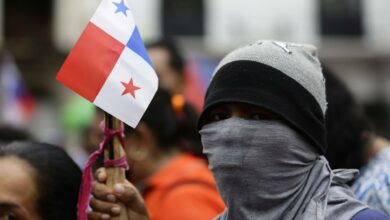Haiti struggles with crippling fuel shortage

Port-au-Prince, Oct 26 (EFE).- The streets of the Haitian capital were largely deserted Tuesday on the second day of a general strike to protest a reign of terror by well-armed gangs and a worsening fuel shortage.
Shops, banks and other establishments remained closed and the number of peddlers venturing out in search of business was smaller than on Monday.
In the heart of Port-au-Prince, there was little vehicle or pedestrian traffic in the normally bustling area around the main market, which is located near one of the neighborhoods dominated by the G9 Fanmi e Alye (G9 Family and Allies) federation of gangs.
The leader of G9 is former police officer Jimmy Cherizier, known as “Barbecue,” a long-time collaborator with the ruling PHTK party who was close to assassinated President Jovenel Moise.
Since Moise’s July 7 death, Cherizier has sought to assert himself in the political arena even as the absence of effective institutions has enabled G9 and other gangs to terrorize residents of poor areas in Port-au-Prince.
In June, 19,000 people in communities on the outskirts of the capital fled their homes to escape the violence.
Amid the political turmoil and the damage done in August by a major earthquake, Haitians are now facing an acute shortage of fuel that has crippled public transportation.
And because the power grid is so unreliable, most Haitian businesses rely for electricity on generators powered by gasoline and cannot operate without fuel.
Even some radio stations are cutting back on broadcasting hours to save fuel, which has broader implications as radio is the most important source of news in a country where more than a third of the population is illiterate.
Efe confirmed that the fuel crisis is due mainly to roadblocks erected by the various gangs preventing trucks from delivering the fuel stored in tanks at the harbor in Port-au-Prince.
The lack of fuel for generators has forced 50 hospitals across Haiti – including 15 in the capital – to shut down, according to information provided to Efe by officials with Unicef.
Port-au-Prince’s La Paix University Hospital should have received 5,000 gallons (18,926 liters) of fuel this week, but the distributor has yet to figure out a way to deliver it safely.
La Paix was virtually deserted when Efe visited the hospital on Tuesday.
The strike and the fuel shortage “have paralyzed all services” and the hospital is not admitting new patients, a pediatrician identifying himself only as Jean said.
In the pediatrics department, the focus is on treating the eight patients admitted before the shutdown and providing basic care to children who come in with relatively minor problems, he told Efe.
Jean’s colleague Darlin Dorvil said that the absence of stable electricity presents a serious challenge for the hospital’s neo-natal ward, which needs power to operate incubators for premature babies.
While the general strike is set to end at midnight Wednesday, there is no sign of a resolution of the fuel crisis. EFE
mmv/dr





